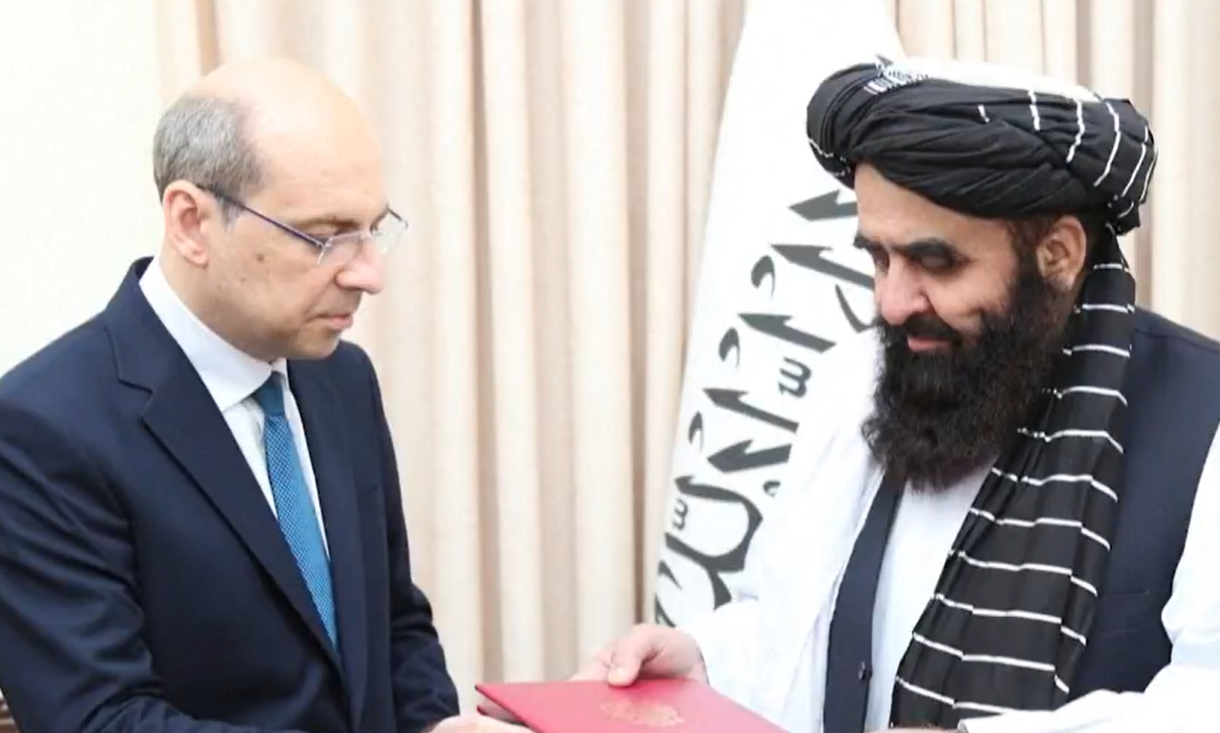Russia's recognition of the Taliban in Afghanistan
Moscow has become the first government to complete the normalisation of relations with the Islamic Emirate of Afghanistan. Since 2018, Russian policy towards the Taliban had begun to change, moving from formal opposition to an evident search for cooperation. But the new friendship with Kabul will develop in the usual style of mutual suspicion and cross-checking
Moscow (AsiaNews) - On 3 July, the Russian Federation became the first country in the world to fully recognise the government of the radical Taliban movement, which took power in 2021 in what is now declared the Islamic Emirate of Afghanistan and has now raised its flag over the Afghan embassy in Moscow.
The reasons behind this decision and its possible consequences are discussed in Asia Plus by Afghan political analyst Farid Muttaki, professor of political economy at the University of Bremen in Germany, who has long documented war crimes and human rights violations in Afghanistan.
Recalling the history that preceded the Taliban's return to Kabul, he notes that Russia's attitude towards this extremist movement has always been rather ambiguous, oscillating between cautious cooperation, strategic negotiations and pragmatic distancing. In the country invaded by the Soviets in 1979, where Russia's ability to dominate the geopolitical balance in the last century effectively crumbled, Russia has therefore sought to limit the damage and threats to regional security in Central Asia by countering terrorism and trying to save its interests in this crucial area.
Since the fall of the Taliban regime in 2001, the main goal has always been to prevent the reorganisation of armed groups that could destabilise the region in various ways and on numerous occasions.
Moscow has always maintained a rather sceptical attitude towards the Islamic republic established in 2001, considering it a “Western puppet”, but formally remaining at its side in containing the radical tendencies of the Taliban and other groups, with whom it nevertheless sought to conduct behind-the-scenes negotiations.
Since 2018, Russian policy towards the Taliban has begun to change, moving from formal opposition to an evident search for cooperation. The first official negotiations with representatives of the movement took place in 2019, a first sign of recognition of their participation in building an alternative future in Afghanistan.
As Muttaki explains, these meetings were aimed at “a political settlement linked to a reduction in violent actions”, even though Moscow did not intend to recognise the Taliban as a legitimate political force, but rather to intensify its pressure on the Kabul government and also on other players in the regional arena, such as China and Pakistan, with whom Russia participated in the Quadrilateral Coordination Group with the United States to “ensure stability in Afghanistan”..
Thus, through various stages of successive upheavals, we have arrived at the current recognition, in which Russia considers the Taliban government to be ‘a decisive factor in containing extremist pressures’ from ISIS-Khorasan in its various sectors and in strengthening Russia's role as the main mediator in the entire region after the withdrawal of the US army.
Now the Taliban are expecting ‘a wave of Russian spies in Afghanistan’, according to Kabul government documents published in Nezavisimaya Gazeta, and the new friendship with the Russians will develop in the usual style of mutual suspicion and cross-checking.
The Kremlin's choice could also lead China, Iran, Pakistan and perhaps the Persian Gulf states - which have long had relations with the Taliban - to complete the process as Moscow has done, further weakening the Taliban's isolation.
This move is part of Russia's global strategy in its conflict with the entire West, blocking Western humanitarian aid mechanisms and reaffirming its control in this sector as well. The political scientist, along with many other commentators, wonders how much Russia will be able to act alone, or in coordination with its close circle of regional partners, and guarantee the necessary level of stability and economic support to the Taliban-led Afghanistan, rather than dragging Kabul into the long-term international isolation in which Moscow has now sunk with the war in Ukraine.
02/09/2021 09:57
26/08/2021 11:47
20/08/2021 10:20
17/05/2005







.png)










